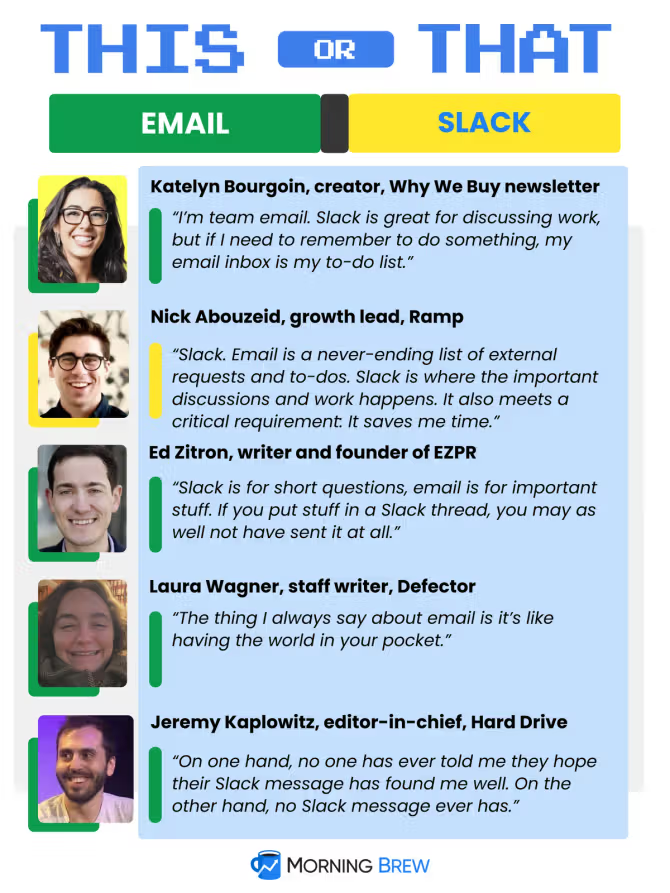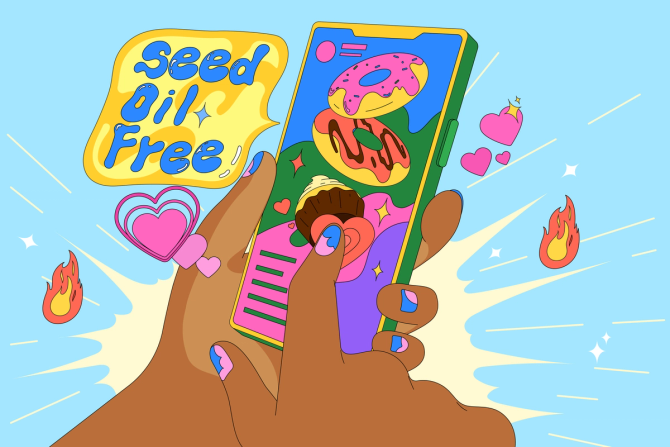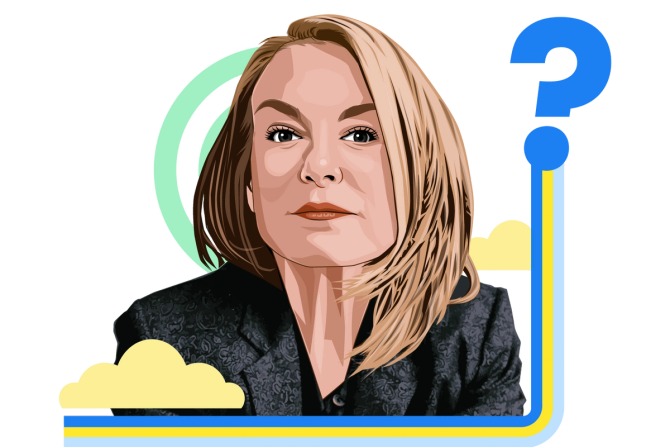| | | | | |  Jiaqi Wang | | IN THIS ISSUE | Cheating goes viral | Influencers target seed oils | Esther Perel has some advice | | | | "Would I say this if it weren't true? Not a chance..."—Peloton CEO Barry McCarthy, in an internal memo assuring employees he was optimistic about the company's future after firing 500 employees "Now everybody can probably sit down in their seats and watch the ballgame."—Aaron Judge on breaking Roger Maris's single-season home run record in the American League "No one should be in jail just for using or possessing marijuana."—President Joe Biden on his decision to pardon people convicted of federal marijuana charges | | |  —Rohan Anthony and Ashwin Rodrigues | | | Nobody likes a cheater, but we do love a cheating scandal. Maybe it's the feeling of someone getting justice, or of learning that a nearly impossible victory was, in fact, impossible. Steroid use in the MLB and deflated footballs in the NFL, where millions of eyes watch professional athletes earn millions of dollars, have long been sources of intrigue and resulted in serious penalties. But recent cheating allegations in lesser-watched competitions have captured public interest and are just as sensational as the prime-time scandals. Last week in Ohio, a fishing tournament director grew suspicious, thinking that a group of walleyes set to take first place had weighed in heavier than they looked. He dramatically sliced a fish open to find weights in its stomach. "Get the f*** out of here!" Jason Fischer (yes, this story also includes a fishing judge named Fischer) screamed at the contestants. It might seem like an overreaction, but $30,000 was on the line. The incident has gone viral on TikTok and other social media platforms. The night before, a wildly unlikely poker upset led the loser to accuse his opponent of using surveillance tech to cheat him out of a $265,000 pot. In a detailed tweet with screenshots from the Notes app, Garrett Adelstein laid out the play-by-play of why he doesn't think the uncommon winning hand was a stroke of luck, and just how his opponent, Robbi Jade Lew, may have rigged the hand. It's a highly complicated theory, full of poker jargon the average person likely can't grasp, but more than 7 million people have watched a video on Twitter of the maneuver, where Adelstein looks shocked, and Lew takes his money with a smirk on her face. And in the chess world, a 19-year-old bested a world champion to take home a $350,000 prize in St. Louis in September. Because of the cheating allegations, Magnus Carlsen, the match's loser, has vowed not to play Hans Niemann again. The allegations led Chess.com to conduct an investigation into Niemann's games there, and he is now accused of cheating more than 100 times on the platform. All of this cheating—some proven, some not—is playing out not just in the dedicated communities that follow fishing, poker, and chess, but in the broader world of internet culture. That's piquing the interest of an audience with an insatiable thirst for drama. It's likely not the reason these competitions want attention, but they've got it. —Amanda Hoover | | | A Sunday crossword that nods to the news of the week. Play it here. | | | | | | Wish you could ask your language-learning app that? With Babbel's speech recognition technology, you can—and you can do it at a sweet discount, too. Babbel's premium, subscription-based platform was developed by real experts to help you have real conversations in one of *14* different languages. The 10-minute lessons help you learn how to converse in a way that interests you. Plus, Babbel makes language learning fun with podcasts, games, videos, articles, and live online classes. Grab your *limited time* 60% off discount and subscribe to Babbel here. | | | | Jiaqi Wang Holding up the remains of a bullet-riddled plastic bottle of LouAna peanut oil, the shirtless, jacked influencer Brian "Liver King" Johnson makes a declaration. "We just saved lives," he says. Moments before, he emptied two machine guns into various cooking oils: corn, peanut, canola, and more, which are all "dangerous" and "destructive" for human health, he claims. It's a perfect distillation of the latest diet trend: avoiding seed oils. "Seed oils" refers to a variety of popular cooking oils, including canola, soybean, sunflower, and corn oils. The public decrying of seed oils began as a fringe fitness forum quibble, dating to the paleo diet craze of the early 2000s. But it's slowly leaked into mainstream conversations on TikTok and even Joe Rogan's podcast, where the host recently called cooking with grapeseed oil a "crime against nature." The common kitchen ingredient is now vilified as "industrial," and its detractors have linked it to everything from inflammation to sunburns and Alzheimer's disease, frustrating some health and nutrition experts. Some experts believe the anti-seed oil trend is sticking because it often feeds into larger conspiracy theories, in which powerful corporate interests have pushed a poison that is contributing to a host of physical ailments. Most medical organizations actually recommend replacing foods with high saturated fat contents, like butter and ghee, with polyunsaturated fats (PUFAs), which include seed oils. But for the conspiratorially minded who are skeptical of any large institution, medical consensus can also be proof that seed oils should be avoided at all costs. Or maybe even shot with a gun. (Liver King isn't alone in this endeavor: Tucker Carlson's The End of Men documentary also features a shirtless man firing rounds into a lineup of canola oil.) That's how "you get these very strange bedfellows," Tim Caulfield, health law professor at the University of Alberta, said. Contrarians of various stripes, from anti-vaxxers to bitcoin enthusiasts, share a suspicion of industrial seed oils, as they are often referred to, with a derogatory emphasis on "industrial." And an industry is growing to meet the rising demand for seed-oil-free products: Businesses are capitalizing on this new trend, addressing a market that contains both off-the-grid influencers and HODLers who yearn for a lifestyle untouched by corporate interests. It's a trend that's been bubbling in the background for decades, and seed oils are just the latest enemy. The origin of the disdain for seed oil (also known under the broad moniker of "vegetable oil") dates to the paleo diet of the early 2000s. The lifestyle was pioneered by athlete and best-selling author, Mark Sisson. In his 2009 book The Primal Blueprint, Sisson championed a "back to the beginning" approach to eating, focused on foods that would've been available to cavemen from the Stone Age, aka the Paleolithic "paleo" diet. A component of this "primal" way of living, according to Sisson, is to "avoid poisonous things," including vegetable or seed oils. The most insidious part of the standard American diet, he said, is "industrial seed oils." Sission's diet advice became wildly popular in the early 2010s, when it seemed like every fitness-minded celeb jumped aboard the paleo train, including Twitter founder Jack Dorsey, actor and podcaster Matthew McConaughey, and (perhaps less obviously) former Florida Governor Jeb Bush. In 2015, Sisson co-founded Primal Nutrition, a paleo-friendly food company that offered seed-oil-free products, including mayonnaise, buffalo sauce, and ranch dressing all made with avocado oil. Just a few years later, Kraft Heinz bought the company for $200 million. Sission planted the seed (sorry) for a changing food market, one that catered to niche diets, where fresh food rules and processed foods—including seed oils—were deemed unhealthy. Continue reading this story on food and fitness influencers by Ashwin Rodrigues. | | | If you've ever needed relationship guidance (who among us has not?), then you're probably familiar with Esther Perel, psychotherapist, New York Times best-selling author, and host of two podcasts, Where Should We Begin? and How's Work? If that wasn't enough to impress you, she's fluent in nine different languages while she runs her own therapy practice in New York City and serves as a consultant for Fortune 500 companies. You might also recognize Perel from her viral TED Talks, which have gotten more than 40 million views combined. She still somehow managed to have enough time to launch a game, Where Should We Begin—A Game of Stories, that helps players explore connection and reconnection with friends, family, and lovers. We're thrilled Perel took time from her ultra-busy schedule to fill out our Questionnaire. What's the best advice you've ever received? I don't believe that there is one piece of advice that is "the best." Throughout life we receive lots of great advice on both what to do and what not to do. Sometimes this advice comes in the form of "useful advice"—things you can apply in the day to day—and other times it is simply a truth that shifts your perspective in meaningful ways. Two of my favorites include: - Useful advice: Don't just squeeze people into your busy schedule. Do it with intention. Our lives get so full, it's easy to pencil in time with friends and loved ones as you would a business meeting, but everyone—no matter how they show up in your life—wants to feel that their time with you is meaningful.
- A truth: There's no love without a fear of loss. So if you want to experience intense connections, you have to know that those feelings must live side by side with the fear of losing that love.
What's the most embarrassing song you'll admit to liking publicly? With the right kind of humor, I find very few songs embarrassing. They become funny or ironic. Even my marching songs that I used to sing as a kid hold some sort of meaning. What fictional person do you wish were real? The characters that I read about in my children's books growing up, like Le Petit Prince in the book by Antoine de Saint-Exupéry, had these extraordinary adventures that I always envied. It would be incredible if these characters were real; my younger self would love to be their friend. What real person do you wish were fictional? There are so many. I love real characters that become fictionalized because oftentimes there are so many different "takes" on the same person. You get to see the person through various lenses.
For example, I would love to see how different directors and writers would portray Camille Claudel—the famous sculptor and muse of French sculptor Auguste Rodin (she has her own room at the Musée Rodin in Paris). Some have said she was a "mad woman," others that she was a woman who could not compete with Rodin himself. I am fascinated by the different ways she could be portrayed today.
The film Round Midnight is an enamoring example of what can happen when we make a real person fictional. Dexter Gordon plays the protagonist Dale Turner, who is a composite of real-life jazz musicians Bud Powell and Lester Young. I highly recommend the film. What always makes you laugh? When a situation is about to be completely derailed, my husband infuses it with humor and lightness; he has great comedic timing. If you were given a billboard in Times Square, what would you put on it? The quality of your relationships determines the quality of your life. —Interview by Rohan Anthony
| | | | | | Better sit down for this deal. Save BIG on everything your home needs during Wayfair's 5 Days of Deals. Plus, 10% of sales profits** will benefit Community Solutions, supporting an end to homelessness. You save big and Wayfair gives back, so shop the deals now. | | | | The Taxorcist: This Spooky Season we're kicking off the Financial Hall of Horrors, a series that explores the ghoulish side of personal finance. Our first entry is The Taxorcist—a harrowing tale of one freelancer learning that they owed the IRS about $25,000 in taxes on their earnings. Find out the bloodcurdling end to this story, as well as ways to escape the freelance tax bloodbath. [Money Scoop] AI grocery lists: Did you know that grocery stores also make grocery lists? They do—and they're more involved than just "the entire frozen section of Trader Joe's." Now, some grocers are turning to AI to help mitigate costs, grocery "shrink," and even carbon and water emissions. Hopefully this translates to our avocados staying riper for longer. [Emerging Tech Brew] #BookTok's clout: It turns out BookTok isn't just for posting videos of yourself crying over the end of The Song of Achilles. It's also quickly becoming a major part of the publishing industry's strategy to market books that otherwise may not receive much attention. From extensive, three-minute book reviews to seven-second clips overlayed with a popular sound, TikTok vids can turn a book into the next bestseller. [Sidekick] You're getting…fired? We think? With layoffs recently in the news, we take you behind the scenes of the firing process. Only this particular boss certainly doesn't know how to (or really want to) fire anyone. [Morning Brew] The best thing we read this week: As one of the world's best actors, Christian Bale has spent decades pretending not to be himself. He also keeps trying to quit Hollywood—with little success. Bale has three movies coming out this year and talked to GQ about his life, which he sometimes can't fathom. [GQ] $marter $pending: Money with Katie is here to help you manifest your financial freedom with her weekly newsletter, which takes a spicy approach to smart spending habits, tax strategies, and investing. Subscribe for free. | | |  —Ashwin Rodrigues | | | ✳︎ A Note From Wayfair **Wayfair is giving 10% of sale profits from this event to the nonprofit Community Solutions, which helps communities in the U.S. solve homelessness. "Profits" means net revenue minus wholesale, shipping, and other product-related costs, customer service costs, and merchant fees, plus credit card points and rebates. Promotion will begin October 7 (9 am ET) to October 11 (11:59 pm ET). |  | Written by Rohan Anthony, Stassa Edwards, Amanda Hoover, Sherry Qin, Ashwin Rodrigues, and Holly Van Leuven Was this email forwarded to you? Sign up here WANT MORE BREW? Industry news, with a sense of humor → - CFO Brew: your go-to source for global finance insights
- Emerging Tech Brew: AI, crypto, space, autonomous vehicles, and more
- Future Social: the Brew's take on the world of social media
- Healthcare Brew: the comprehensive industry guide for administrators, medical professionals, and more
- HR Brew: analysis of the employee-employer relationship
- IT Brew: moving business forward; innovation analysis for the CTO, CIO & every IT pro in-between
- Marketing Brew: the buzziest happenings in marketing and advertising
- Retail Brew: retail trends from DTC to "buy now, pay later"
Tips for smarter living →  Podcasts → Business Casual, Founder's Journal, Imposters, and The Money with Katie Show Podcasts → Business Casual, Founder's Journal, Imposters, and The Money with Katie Show  YouTube YouTube Accelerate Your Career with our Courses → | ADVERTISE // CAREERS // SHOP // FAQ
Update your email preferences or unsubscribe here.
View our privacy policy here.
Copyright © 2022 Morning Brew. All rights reserved.
22 W 19th St, 4th Floor, New York, NY 10011 | | |















No comments:
Post a Comment